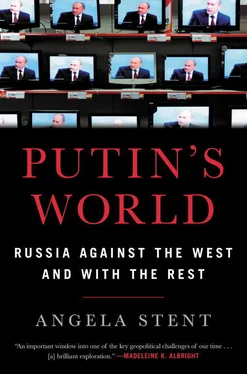38. David A. Shlapak and Michael Johnson, Reinforcing Deterrence on NATO’s Eastern Flank, research report, RR-1253-A (Santa Monica, CA: RAND Corporation, 2016), http://www.rand.org/pubs/research_reports/RR1253.html.
39. Richard Shirreff, War with Russia: An Urgent Warning from Senior Military Command (London: Coronet, 2016).
40. President of Russia, “Berlin: Speech at Meeting with German Political, Parliamentary, and Civic Leaders,” transcript, June 5, 2008, http://www.europarl.europa.eu/meetdocs/2004_2009/documents/dv/d_ru_20080617_04_/D_RU_20080617_04_en.pdf.
41. “The Draft of the European Security Treaty,” President of Russia website, November 29, 2009, http://en.kremlin.ru/events/president/news/6152.
42. Richard Weitz, “The Rise and Fall of Medvedev’s European Security Treaty,” policy brief, German Marshall Fund of the United States, May 29, 2012, http://www.gmfus.org/publications/rise-and-fall-medvedev%E2%80%99s-european-security-treaty.
43. The Military Doctrine of the Russian Federation, from Russian presidential website, February 5, 2010, CarnegieEndowment.org, http://carnegieendowment.org/files/2010russia_military_doctrine.pdf; and NATO, The 2010 Strategic Concept: Active Engagement, Modern Defence (Brussels: NATO Publications, 2010), http://www.nato.int/cps/en/natohq/topics_82705.htm.
44. Condoleezza Rice, No Higher Honor: A Memoir of My Years in Washington (New York: Random House, 2011), 672.
45. Quoted in Stent, The Limits of Partnership, 168.
46. Kommersant , “NATO Was Sold to a Blocking State,” April 7, 2008, http://www.kommersant.ru/doc/877224.
47. Stent, The Limits of Partnership, 173–74.
48. “Lavrov Nazval Rasshirenie NATO Oshibkoi, ugrozaiushchei Bezopasnosti Evropa,” https://www.kp.ru/online/news/3026757/.
49. Daniel Treisman, “Why Putin Took Crimea,” Foreign Affairs, May/June 2016, https://www.foreignaffairs.com/articles/ukraine/2016-04-18/why-putin-took-crimea.
50. “Address by President of the Russian Federation,” President of Russia website, March 18, 2014, http://en.kremlin.ru/events/president/news/20603.
51. Oksana Grytsenko and Veronika Melkozerova, “Ukrainians Fight and Die Among Russian Wagner Mercenaries,” Kyiv Post, February 27, 2018, https://www.kyivpost.com/ukraine-politics/ukrainians-fight-die-among-russian-wagner-mercenaries.html.
52. Shaun Walker, “Vladimir Putin Admits Russian Military Presence in Ukraine for First Time,” The Guardian, December 17, 2015, https://www.theguardian.com/world/2015/dec/17/vladimir-putin-admits-russian-military-presence-ukraine.
53. Agence-France Presse in Moscow, “Thousands of Russian Soldiers Sent to Ukraine, Say Rights Groups,” The Guardian, September 1, 2014, https://www.theguardian.com/world/2014/sep/01/russian-soldiers-ukraine-rights-groups.
54. Interfax, “No Russian Troops in Ukraine—Pestov After Obama’s Statement,” Russia Beyond, September 4, 2014, https://rbth.com/news/2014/09/03/no_russian_troops_in_ukraine_-_peskov_after_obamas_statement_39528.html.
55. NATO, Wales Summit Declaration (Brussels: NATO e-Library, September 5, 2014), http://www.nato.int/cps/en/natohq/official_texts_112964.htm.
56. Cheryl Pellerin, “2018 Budget Request for European Reassurance Initiative Grows to $4.7 Billion,” US Department of Defense News, June 1, 2017, https://www.defense.gov/News/Article/Article/1199828/2018-budget-request-for-european-reassurance-initiative-grows-to-47-billion/.
57. “Jens Stoltenberg: NATO Responds to ‘Russia’s Aggression Against Ukraine,’” interview, TASS, June 17, 2016, http://tass.com/world/883050.
58. Ewen MacAskill, “Russia Says US Troops Arriving in Poland Pose Threat to Its Security,” The Guardian, January 12, 2017, https://www.theguardian.com/us-news/2017/jan/12/doubts-over-biggest-us-deployment-in-europe-since-cold-war-under-trump.
59. Steven Sestanovich, “Could It Have Been Otherwise?” American Interest, May/June 2015, http://www.the-american-interest.com/2015/04/14/could-it-have-been-otherwise/.
60. Cyra Master, “Trump Tells German Paper: NATO Is ‘Obsolete,’” The Hill, January 15, 2017, http://thehill.com/homenews/administration/314432-trump-nato-is-obsolete.
61. “Russia Welcomes Trump Calling NATO ‘Obsolete,’” Radio Free Europe/Radio Liberty, January 16, 2017, http://www.rferl.org/a/russia-welcomes-trump-nato-obsolete/28236452.html.
62. Lisa Ferdinando, “Mattis Stresses NATO Importance at Munich Security Conference,” US Department of Defense News, February 17, 2017, https://www.defense.gov/News/Article/Article/1087792/mattis-stresses-nato-importance-at-munich-security-conference.
63. Jonathan Lemire and Jill Colvin, “Trump Claims Germany ‘Controlled’ by Russia, Merkel Differs,” Associated Press, July 11, 2018.
64. David M. Herszenhorn and Lili Bayer, “Trump’s Whiplash NATO Summit,” Politico, July 12, 2018, https://www.politico.eu/article/trump-threatens-to-pull-out-of-nato/.
65. NATO, Brussels Summit Declaration (Brussels: NATO e-Library, July 11, 2018), https://www.nato.int/cps/en/natohq/official_texts_156624.htm.
Chapter Six: Russia and Its “Near Abroad”: How Civilized a Divorce?
1. Tom Parfitt, “Spy Who Came in from the Cold,” The Guardian, December 23, 2007, https://www.theguardian.com/world/2007/dec/23/russia.tomparfitt.
2. “Conference of Russian Ambassadors and Permanent Representatives,” President of Russia website, July 1, 2014, http://en.kremlin.ru/events/president/news/46131.
3. “Moldova’s President Dodon Lines Up with Putin at St. Petersburg Forum,” BNE IntelliNews, June 2, 2017, http://www.intellinews.com/moldova-s-president-dodon-lines-up-with-putin-at-st-petersburg-forum-122814/.
4. Damien Sharkov, “Moldova’s Prime Minister and President at Odds After Putin Trip,” Newsweek, January 18, 2017, http://www.newsweek.com/moldovas-pm-president-odds-after-putin-trip-544008.
5. Alexander Cooley, Great Games, Local Rules (New York: Oxford University Press, 2012), 16–18.
6. Dmitri Trenin, Post-Imperium: A Eurasian Story (Washington, DC: Carnegie Endowment for International Peace, 2011), 27.
7. Bobo Lo, Russia and the New World Disorder (Washington, DC: Brookings Institution Press, 2014), 101.
8. Gerard Toal, Near Abroad: Putin, the West, and the Contest over Ukraine and the Caucasus (New York: Oxford University Press, 2016). On page 34, Toal describes that as “homeland nationalism—the nationalism of a successor state with spatial identity that extends beyond the borders inherited at the time of the collapse of the multi-national state.”
9. The Baltic states fall into a different category from Russia’s point of view. Although Russia was displeased when they joined NATO, the Kremlin has treated them differently from the other post-Soviet states because they only became part of the USSR in 1940.
10. Shaun Walker, “Russia’s Rouble Crisis Poses Threat to Nine Countries Relying on Remittances,” The Guardian, January 18, 2015, https://www.theguardian.com/world/2015/jan/18/russia-rouble-threat-nine-countries-remittances.
11. Sabine Fischer, Not Frozen! SWP research paper 09, German Institute for International and Security Affairs (Berlin: Stiftung Wissenschaft und Politik, 2016), 13–14.
12. “Viacheslav Nikonov: Russkii, Rossiiskii, Russkoiazichny Mir,” February 28, 2011, http://ruskline.ru/news_rl/2011/02/28/net_nichego_rossijskogo_chto_ne_bylo_by_russkim/.
13. Mikhail Suslov, “Russian World”: Russian Policies Towards Its Diaspora, report no. 103 (Paris: Ifri Russia/NIS Center, 2017), https://www.ifri.org/sites/default/files/atoms/files/suslov_russian_world_2017.pdf.
Читать дальше












